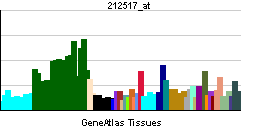ATRN
Jump to navigation
Jump to search
| Attractin | |||||||||||
|---|---|---|---|---|---|---|---|---|---|---|---|
| Identifiers | |||||||||||
| Symbols | ATRN ; DPPT-L; KIAA0548; MGC126754; MGCA | ||||||||||
| External IDs | Template:OMIM5 Template:MGI HomoloGene: 22542 | ||||||||||
| |||||||||||
| RNA expression pattern | |||||||||||
 | |||||||||||
 | |||||||||||
| More reference expression data | |||||||||||
| Orthologs | |||||||||||
| Template:GNF Ortholog box | |||||||||||
| Species | Human | Mouse | |||||||||
| Entrez | n/a | n/a | |||||||||
| Ensembl | n/a | n/a | |||||||||
| UniProt | n/a | n/a | |||||||||
| RefSeq (mRNA) | n/a | n/a | |||||||||
| RefSeq (protein) | n/a | n/a | |||||||||
| Location (UCSC) | n/a | n/a | |||||||||
| PubMed search | n/a | n/a | |||||||||
Attractin, also known as ATRN, is a human gene.[1]
Multiple transcript variants encoding different isoforms exist for this gene. One of the isoforms is a membrane-bound protein with sequence similarity to the mouse mahogany protein, a receptor involved in controlling obesity. The other isoform is a secreted protein involved in the initial immune cell clustering during inflammatory responses that may regulate the chemotactic activity of chemokines.[1]
References
Further reading
- Mori M, Sakurai M, Araie M (1993). "[Topical timolol and blood-aqueous barrier permeability to protein in human eyes]". Nippon Ganka Gakkai Zasshi. 96 (11): 1418–22. PMID 1476071.
- Duke-Cohan JS, Morimoto C, Rocker JA, Schlossman SF (1996). "Serum high molecular weight dipeptidyl peptidase IV (CD26) is similar to a novel antigen DPPT-L released from activated T cells". J. Immunol. 156 (5): 1714–21. PMID 8596018.
- Nagase T, Ishikawa K, Miyajima N; et al. (1998). "Prediction of the coding sequences of unidentified human genes. IX. The complete sequences of 100 new cDNA clones from brain which can code for large proteins in vitro". DNA Res. 5 (1): 31–9. PMID 9628581.
- Duke-Cohan JS, Gu J, McLaughlin DF; et al. (1998). "Attractin (DPPT-L), a member of the CUB family of cell adhesion and guidance proteins, is secreted by activated human T lymphocytes and modulates immune cell interactions". Proc. Natl. Acad. Sci. U.S.A. 95 (19): 11336–41. PMID 9736737.
- Nagle DL, McGrail SH, Vitale J; et al. (1999). "The mahogany protein is a receptor involved in suppression of obesity". Nature. 398 (6723): 148–52. doi:10.1038/18210. PMID 10086355.
- Gunn TM, Miller KA, He L; et al. (1999). "The mouse mahogany locus encodes a transmembrane form of human attractin". Nature. 398 (6723): 152–6. doi:10.1038/18217. PMID 10086356.
- Tang W, Gunn TM, McLaughlin DF; et al. (2000). "Secreted and membrane attractin result from alternative splicing of the human ATRN gene". Proc. Natl. Acad. Sci. U.S.A. 97 (11): 6025–30. doi:10.1073/pnas.110139897. PMID 10811918.
- Deloukas P, Matthews LH, Ashurst J; et al. (2002). "The DNA sequence and comparative analysis of human chromosome 20". Nature. 414 (6866): 865–71. doi:10.1038/414865a. PMID 11780052.
- Strausberg RL, Feingold EA, Grouse LH; et al. (2003). "Generation and initial analysis of more than 15,000 full-length human and mouse cDNA sequences". Proc. Natl. Acad. Sci. U.S.A. 99 (26): 16899–903. doi:10.1073/pnas.242603899. PMID 12477932.
- Gevaert K, Goethals M, Martens L; et al. (2004). "Exploring proteomes and analyzing protein processing by mass spectrometric identification of sorted N-terminal peptides". Nat. Biotechnol. 21 (5): 566–9. doi:10.1038/nbt810. PMID 12665801.
- Friedrich D, Kühn-Wache K, Hoffmann T, Demuth HU (2003). "Isolation and characterization of attractin-2". Adv. Exp. Med. Biol. 524: 109–13. PMID 12675230.
- Bunkenborg J, Pilch BJ, Podtelejnikov AV, Wiśniewski JR (2004). "Screening for N-glycosylated proteins by liquid chromatography mass spectrometry". Proteomics. 4 (2): 454–65. doi:10.1002/pmic.200300556. PMID 14760718.
- Gerhard DS, Wagner L, Feingold EA; et al. (2004). "The status, quality, and expansion of the NIH full-length cDNA project: the Mammalian Gene Collection (MGC)". Genome Res. 14 (10B): 2121–7. doi:10.1101/gr.2596504. PMID 15489334.
- Liu T, Qian WJ, Gritsenko MA; et al. (2006). "Human plasma N-glycoproteome analysis by immunoaffinity subtraction, hydrazide chemistry, and mass spectrometry". J. Proteome Res. 4 (6): 2070–80. doi:10.1021/pr0502065. PMID 16335952.
- Wrenger S, Faust J, Friedrich D; et al. (2007). "Attractin, a dipeptidyl peptidase IV/CD26-like enzyme, is expressed on human peripheral blood monocytes and potentially influences monocyte function". J. Leukoc. Biol. 80 (3): 621–9. doi:10.1189/jlb.1105678. PMID 16835316.
| This protein-related article is a stub. You can help Wikipedia by expanding it. |